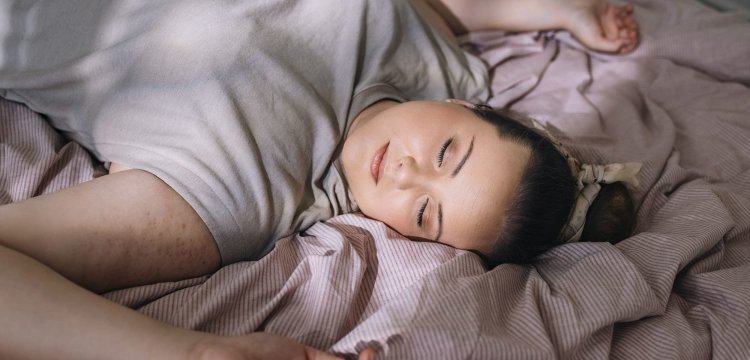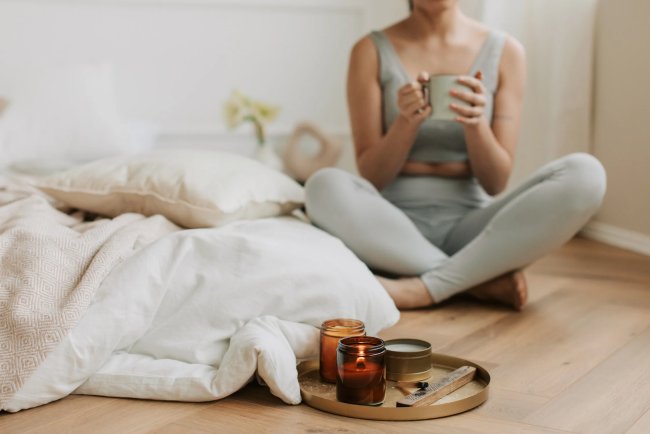Can You Eat Less If You Get More Sleep? Why Getting More Sleep Could Be Your Weight Loss Secret Weapon
We were told for years that the key to losing weight was to eat fewer calories than you burn. However, science has now revealed a much messier picture by peeling back the layers of that extremely neat equation. Stress, hormones, mental health, genetics, and even the length of your sleep each night all have an impact.

And now? Researchers are adding another intriguing thread to the story: getting more sleep may naturally help you eat less, while getting too little sleep may subtly hinder your weight loss efforts.
Why Sleep May Be More Important Than You May Think
According to a recent study in JAMA Internal Medicine, persons who get more sleep not only feel better but also consume a lot fewer calories. Participants who stayed with their usual short sleep patterns consumed almost 270 less calories per day on average than those who slept more.
Without anyone being advised to cut back on food or increase their physical activity, that amounts to about 2,000 calories each week. No counting macros, no boot camps at 5 a.m. Simply get more rest.
"Improving sleep hygiene and prolonging sleep length could be an underutilized tool in the toolset for weight control — especially for people who are overweight," states Dr. Beth Frates, director of lifestyle medicine and wellness at Massachusetts General Hospital.
The Research: Sleep, Calories, and Inconspicuous Changes
Over the course of four weeks, 80 adults aged 21 to 40 who all had BMIs in the overweight range (25.0 to 29.9) were monitored in this randomized clinical research.
Everyone slept according to their regular schedules for the first two weeks. Participants were then divided into two groups:
Taking into consideration the real-life challenges of partners, children, pets, and unpredictable schedules, Group One received individualized sleep coaching, which included one-on-one guidance on how to prolong their overnight slumber.
Group Two made no adjustments and carried on with their usual lack of sleep.
Nobody changed the way they ate or worked out. However, compared to the control group, which gained slightly less than a pound on average, the extra-sleep group slept more than an hour longer each night, consumed fewer calories, and lost around a pound.
What Effect Does Sleep Have on Appetite? The hormones are to blame.
It turns out that your Netflix binges and late-night scrolling are disrupting your biochemistry in addition to taking away your sleep.
Hormones that control appetite are directly impacted by sleep. When you do not get enough sleep:
Your appetite goes into overdrive as ghrelin, the hunger hormone, rises.
You get dissatisfied when your levels of leptin, the hormone that indicates fullness, drop.
You may have cravings for comfort foods high in carbohydrates, engage in mindless snacking, and overeat due to that hormonal combination.
Those hormones tend to rebalance as you get more sleep. Even if you only stand more or take a quick walk, you may feel more energized to be active and feel fuller and less hungry.
Beyond Calories: Vitality, Emotion, and Motion
The most intriguing aspect is that, despite not being instructed to alter their level of activity, participants who slept more frequently reported feeling more alert, energized, and motivated to move, even if only within the house.
Getting more sleep may help improve mood and lessen stress. And that counts: weariness and a bad mood are frequently the causes of emotional eating and desires. The silent remedy for those "I need a brownie just to survive this day" times might be better sleep.
However, it is not a panacea.
There were certain restrictions on the study. How long individuals continue to sleep for longer periods of time is unknown to us. We do not know what they were eating, when they were eating it, or if they made healthier decisions overall.
Furthermore, calories are only one aspect of health, as Dr. Frates notes. The components of those calories—fiber, protein, sugar, and fat—have a significant effect on metabolism, energy, and mood.
Furthermore, quantifying subjective feelings such as hunger, desires, and emotional state would provide additional understanding of the biological and behavioral effects of sleep.
So, how do you really get more sleep? Give it a try.
A radical change in lifestyle is not necessary to improve sleep. Little adjustments can have a significant impact:
Maintain a Sleep Log: Note when you go to bed and wake up. The first step to change is awareness.
Put on a sleep tracker: Fitness bands or smartwatches with sleep functions can tell you when you are sleeping and when you are just lying in bed.
Give Up Screen Time Before Bed: Turn off your electronics at least half an hour to an hour before bed. Blue light fools your brain into believing it is still sunlight and inhibits the generation of melatonin. Modify Your Bedroom: Rooms that are quiet, dark, and cool promote deeper, more restful sleep. Establish a Wind-Down Ritual: This could include reading something that does not make you feel down, taking a warm bath, drinking herbal tea, or stretching lightly.
Conclusion: Sleep Is a Strategy, Not a Lazy Activity
Sleep is not a passive, meaningless state. It is an essential biological function that regulates hormones, sharpens your intellect, and even affects your appetite.
Consider starting with your nighttime routine rather than your diet if you are seeking to reduce weight or just feel better about your body.
Because often the simplest health advice seems the most revolutionary: Go to bed.
What's Your Reaction?





















